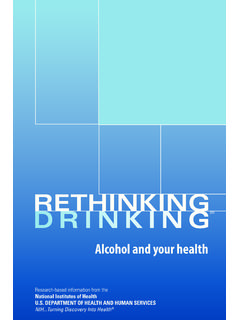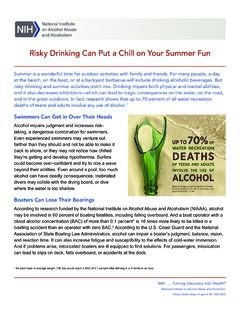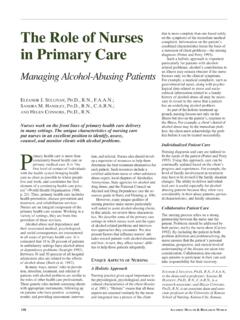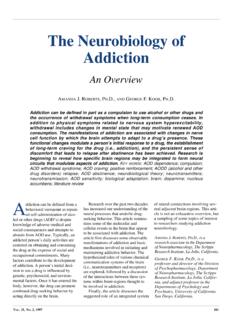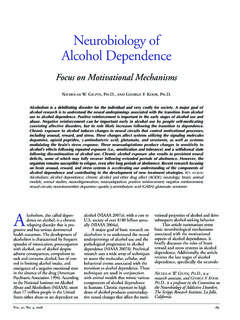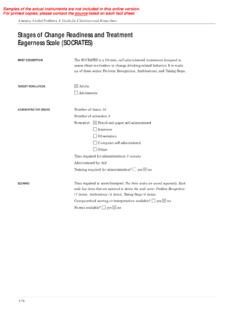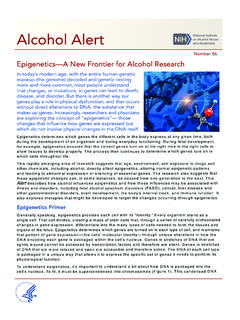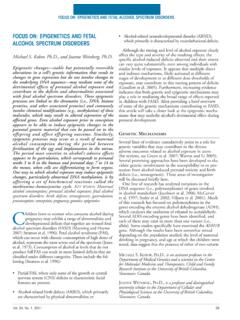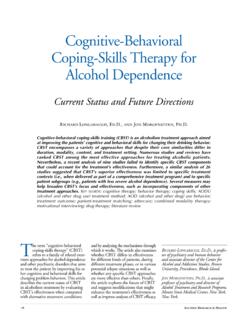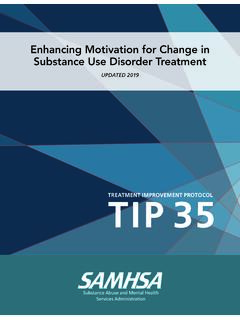Transcription of Motivation for Change and Alcoholism Treatment
1 Motivation for Change and Alcoholism Treatment Carlo C. DiClemente, , Lori E. Bellino, , and Tara M. Neavins, Motivation plays an important role in Alcoholism Treatment by influencing patients to seek, complete, and comply with Treatment as well as make successful long-term changes in their drinking. Both alcohol-abusing and alcohol-dependent people can be classified into different stages of Change in terms of their readiness to alter their drinking behavior. Consequently, researchers have had to consider more seriously the role of Motivation in the Treatment of and recovery from substance abuse and to incorporate motivational enhancement strategies into Treatment programs.
2 KEY WORDS: Motivation ; addiction care; stages of Change ; AODD. (alcohol and other drug dependence) recovery; Treatment ; AOD (alcohol and other drug) use behavior; behavioral Change ; AODU (alcohol and other drug use) Treatment method;. motivational interviewing ; intervention; patient Treatment matching; literature review M. otivation is an important first making changes in one's behavior), and 1990) have demonstrated that people step toward any action or maintenance ( , changing one's lifestyle with alcohol and other drug problems Change in behavior.
3 Sayings to maintain new behavior) offer a new who seek or participate in Treatment such as You can lead a horse to water, perspective on Motivation and the process differ significantly in their levels of but you can't make it drink reflect the of behavior Change (DiClemente and Motivation to Change . Using an alcohol fact that people generally will not perform Prochaska 1998; Prochaska et al. 1992). version of the University of Rhode desired behaviors unless or until they are Recognizing that patients vary in their Island Change Assessment (URICA).
4 Motivated to do so. Until recently, many Motivation or readiness to Change , scale, DiClemente and Hughes (1990). Alcoholism Treatment professionals used researchers have designed interventions reported on the various stages of Change this approach when treating alcoholic and treatments to enhance Motivation among alcohol-dependent patients patients, contending that interventions (DiClemente et al. 1992; Higgins and seeking outpatient Treatment . Patients were useless until the alcohol-dependent Budney 1993; Miller and Rollnick 1991; in the precontemplation stage were more patient was self-motivated to Change his Miller et al.)
5 1992; Stitzer et al. 1993). likely to deny that they had a drinking or her drinking behavior. This article examines the concept of problem, stating, for example, I am During the past several years, however, Motivation and its influence on behav- not the person with the problem. It does researchers and clinicians have shown ior Change , the role of Motivation in not make much sense for me to be here . increased interest in the concept of moti- Alcoholism Treatment , and Treatment or As far as I am concerned, I do not vation and the role that Motivation methods designed specifically to influ- plays in recovery from alcohol problems.
6 Ence Motivation . Researchers have outlined a series of stages CARLO C. DICLEMENTE, , is a of Change to describe the process that a professor and chair of the Department of person goes through when making a Stages of Change Psychology and LORI E. BELLINO, , behavioral Change . Those stages pre- and the Transtheoretical and TARA M. NEAVINS, , are graduate contemplation ( , not yet considering Model of Change students in the Human Services Psychology Change ), contemplation ( , considering Program and research assistants to Dr.)
7 Change but not taking action), preparation A number of studies ( , Carney and DiClemente at the University of Maryland, ( , planning to Change ), action ( , Kivlahan 1995; DiClemente and Hughes Baltimore County, Baltimore, Maryland. 86 Alcohol Research & Health Motivation and Alcoholism Treatment have any [alcohol] problems that need Change his or her drinking behavior. In As pointed out by Miller and Rollnick changing. Conversely, patients in the the contemplation stage, the patient (1991), traditional approaches to treat- preparation and action stages were more decides to Change his or her behavior ing unmotivated patients with alcohol likely to admit that they had a drinking after weighing the positive and negative problems often use aggressive and con- problem, stating, for example, I am aspects of Change .)
8 In the preparation frontational strategies in response to actively working on my [alcohol] prob- stage, the patient increases his or her the patients' denial. In one widely used lem and I have a problem and I really commitment to Change and plans to approach, a team of family members, think I should work on it. take action. In the action stage, the friends, and colleagues unite to con- Using the same scale, Carney and patient develops specific behavioral front the drinker and convince him or Kivlahan (1995) found similar profiles strategies to Change his or her drinking her that Alcoholism Treatment is neces- among a large group of substance- behavior.
9 Finally, in the maintenance sary (Johnson 1986; Liepman 1993). abusing veterans. The same variations stage, the patient strives to avoid relapse Recent evidence indicates, however, in Motivation have been found in other by developing a lifestyle that supports that confrontation can foster denial and Treatment -seeking populations, includ- the changes in his or her drinking. For resistance in the drinker (Miller et al. ing inpatient substance abusers (Isenhart successful recovery, patient Motivation 1993). As Miller (1985) emphasized in 1994) and polydrug users in methadone is important throughout the entire pro- his review of the Motivation literature, maintenance Treatment (Belding et al.)
10 Cess, although it is an especially impor- clinicians who work with unmotivated 1995). Recognizing these differences tant focus during the first three stages. patients must implement less confronta- was the first step to evaluating how differ- tional and more Motivation -generating ences in Motivation affect participation Treatment approaches. in Treatment programs and drinking Motivation To Change and outcomes. Motivation for Treatment Assessment of Motivation presents a Sources of Motivation significant challenge. External influences Motivation appears to be a critical dimen- and pressures, as well as internal thoughts sion in influencing patients to seek, Research investigating sources of moti- and feelings, contribute to a person's comply with, and complete Treatment vation for Change typically has compared Motivation both to consider and impl- as well as to make successful long-term intrinsic sources of Motivation (.
